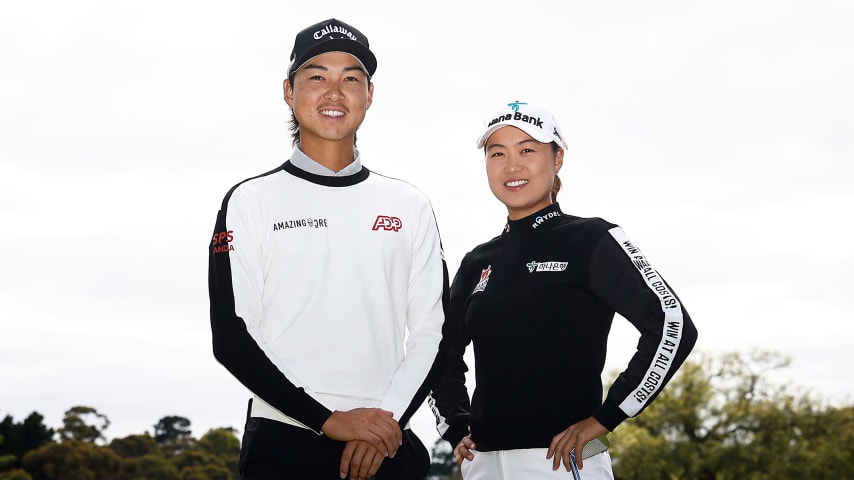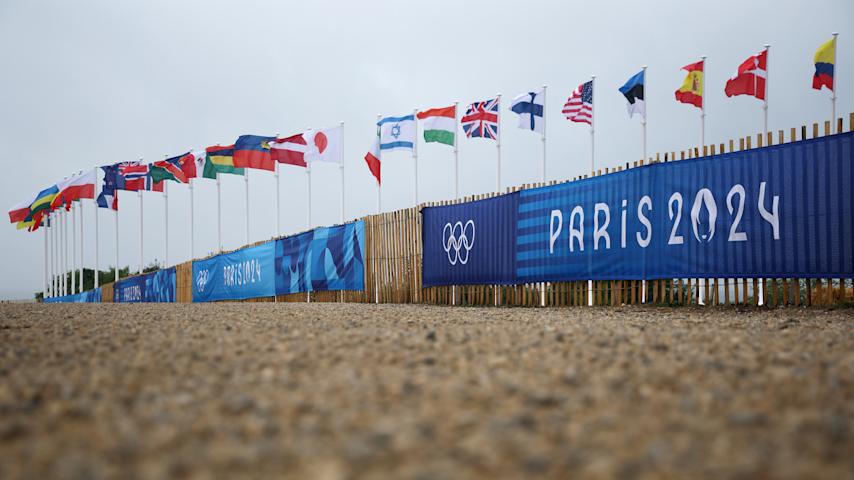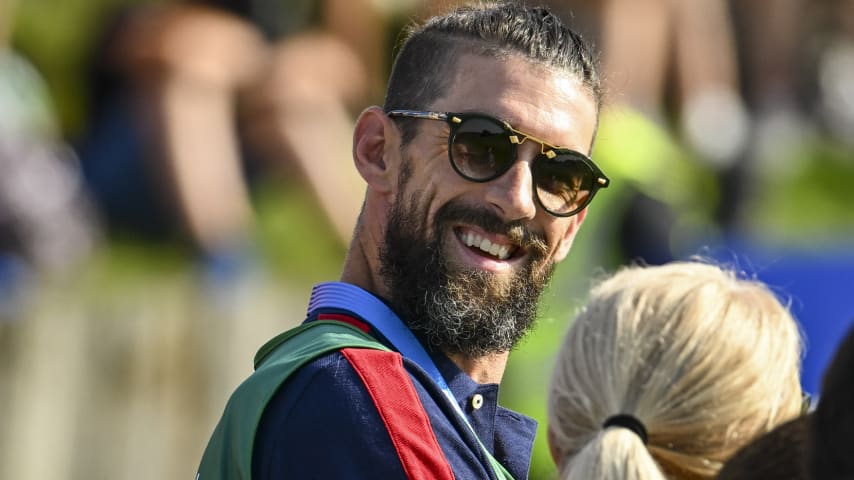Golf’s return to the Games: The one vote that made all the difference
14 Min Read

Ty Votaw on unpredictability of getting golf into Olympics
Written by Ty Votaw
Editor’s note: In 2008, the leaders of golf on both the amateur and professional sides of the sport decided the time was right to petition the International Olympic Committee on behalf of golf for inclusion as an official Olympic sport, starting with the 2016 Games. The PGA TOUR eventually “loaned” its Executive Vice President, Ty Votaw, the former LPGA Commissioner, to the International Golf Federation so he could serve as Executive Director during golf’s bid to get into the Games. Votaw, now retired and living in Ponte Vedra Beach, Florida, recalls in the first of a three-part series about the many twists and turns that took place prior to the vote that would determine golf’s Olympic future.
I was both confident and nervous.
In law school, I was taught how to hold two conflicting thoughts in my head at the same time, and I was doing just that.
What was causing the range of emotion? I was in Minnesota in August 2009, awaiting a vote taking place in Berlin, Germany. The group charged with trying to get golf admitted as an official Olympic sport, of which I was part, anticipated a decision by the International Olympic Committee’s Executive Committee to cut the number of sports vying to be added to the Olympic Programme from seven to two. Golf was one of those seven sports, along with baseball, softball, karate, rugby sevens, roller sports and squash.
The IOC Executive Committee consisted of 15 people, and this vote was on the viability of all seven sports. There was no set number of sports – if any – that would become finalists, only that the IOC would vote to add a maximum of two sports to the 2016 Olympic Games during the Olympic session in Copenhagen, Denmark, in October.
Over the previous 15 months, we had presented on numerous occasions why we felt golf would be an excellent addition to the Olympics, and now we waited. The 15 committee members would cast their ballots, examine the results and then have another round of voting, followed by a third round or more, if necessary, until a sport achieved a majority of the votes.
In each of the first of two rounds of voting, golf received only one vote in favor of its inclusion.
One. Yet, that single vote was so important because it allowed our sport to move into the third round of voting. Those sports with no votes were eliminated.
Had that one Executive Committee member not voted in golf’s favor – and with a secret ballot, we had no way of knowing who the one voter was – golf’s bid would have ended. That, as they say, would have been that.
In the next round of voting, golf’s fortunes began improving. Golf accrued more votes and got through again, with additional sports falling by the wayside. Finally, the committee cast its final ballot.
The results? Two sports survived – rugby sevens and golf, and those two would be presented to the full IOC membership in Copenhagen for the final vote.
In election parlance, we won the primary. But, looking back, if that one committee person hadn’t voted for golf, Copenhagen, as far as golf was concerned, would have never happened. Because of the Executive Committee’s decision, a trip to Copenhagen was in our future.
Fifteen months earlier, I was sitting at my desk at PGA TOUR headquarters in Ponte Vedra Beach on a May afternoon. I looked up and saw Commissioner Tim Finchem standing in my office doorway. He was there to talk Olympics, mainly about what the PGA TOUR could do to try to get golf added as a men’s and women’s Olympic sport for the 2016 Summer Games and how he wanted me to help make that happen.
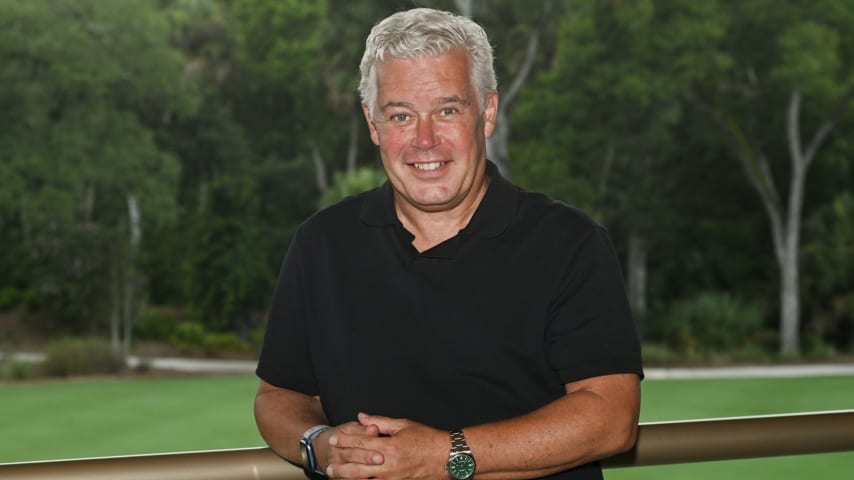
A photo of former PGA TOUR Executive Vice President Ty Votaw. (Chris Condon/PGA TOUR)
Tim had met with other members of the World Golf Foundation board at the 2008 Masters, and it was at that meeting at Augusta National where David Fay, Executive Director of the USGA, and Peter Dawson, CEO of The R&A – the two serving as co-chairs of the International Golf Federation – asked Tim for his thoughts and possible support concerning golf becoming part of the Olympics.
David and Peter laid out for Tim the results from a survey they had taken of the existing national golf federations around the world, all IGF-member organizations. One of the questions was what was the best way to grow golf as a sport in their countries? An overwhelmingly high percentage of the responses was that golf needed to be an Olympic sport, a designation that would open government and national Olympic committee financial support.
The Olympics were also in a stage of transition. The Games’ amateur ideal had been shifting through the years, reaching a crescendo in 1992 in Barcelona, Spain, with the U.S. famously for the first time not sending college basketball players to represent the country but instead using the best players from the NBA. The formation of the “Dream Team” truly changed what type of athlete could now compete at the Olympics, and that was trickling down to golf and its bid.
To even consider golf as an Olympic sport, the IOC wanted an assurance that the best players in the world – men and women – would compete in the 2016 Games. Tim came to the conclusion that he did not want the PGA TOUR to be seen as an obstructionist, and no matter how difficult, he was ready to schedule the 2016 PGA TOUR season around the Olympics so TOUR players could compete. The LPGA felt the same way.
But if PGA TOUR players were going to represent their countries, and therefore impact the PGA TOUR’s tournament schedule, a condition for that support was the TOUR would be significantly involved in the bid. That’s why Tim stopped by my office, where he asked me to work with Peter to coordinate the bid.
I also realized how important Tim’s involvement in all of this was. As commissioner, with so many things on his plate, he could have left the bid for other organizations to pursue. But Tim felt that being a part of the Olympics would help grow the game around the world, and he fully supported golf’s return to the Olympics.
Return is an important word. Golf was twice part of the Olympics, in the competition in both 1900 in Paris and again in 1904 in St. Louis, Missouri. American Charles E. Sands won the first gold medal in 1900, and Canadian George Lyon won gold at Glen Echo Country Club in 1904. However, in 1908, golf disappeared from the program and, for a multitude of reasons, had remained outside the Olympics for the next 100 years.
The 116 golf federations throughout the world and the 19 golf organizations and professional tours scattered around the globe felt the time was right to petition for golf’s reinstatement. Again.
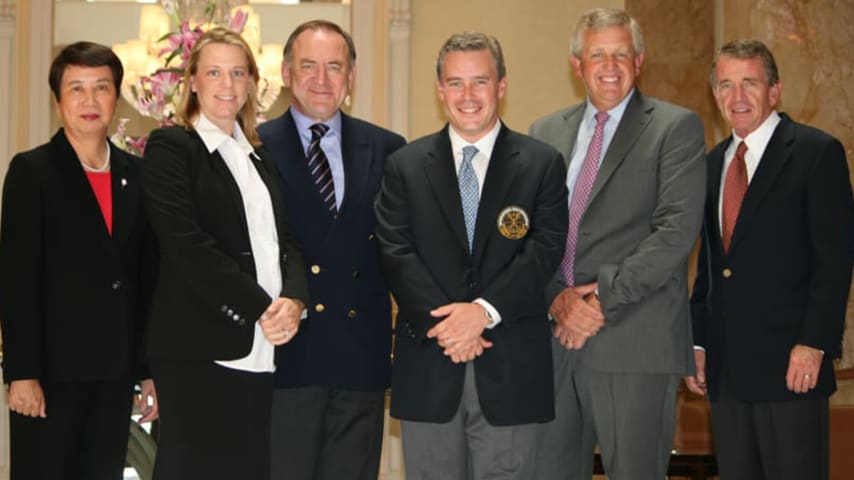
From left to right, LPGA of Japan President Chako Higuchi, Annika Sorenstam, IGF Co-Secretary Peter Dawson, PGA TOUR Executive and IGF Executive Director Ty Votaw, Colin Montgomerie and PGA TOUR Commissioner Tim Finchem pose while presenting golf's Olympic bid for the 2016 Olympics to the IOC in Lausanne, Sweden. (Mike McGee/Annika Sorenstam Family)
Sixteen years earlier, an organized and concerted effort among the PGA TOUR, the LPGA, the United States Golf Association, the PGA of America and, most importantly, Augusta National Golf Club began. The intent was to get golf added to the Olympics, with the eye on the 1996 Atlanta Summer Games. The venerable home of the Masters was willing to host both the men’s and women’s competitions as part of the Atlanta Games.
The difference between then and what we were trying to accomplish? Even with PGA TOUR and LPGA support, the “Augusta” plan of the 1990s was for amateur golfers to compete. But Atlanta Olympic golf never materialized.A subsequent attempt for golf to be a part of the 2008 Beijing Games, an effort that lacked comprehensive support, also failed.
I felt honored to be a part of this attempt, starting in the spring of 2008, knowing ours featured unprecedented, unified support from both the amateur and professional golf worlds. Every significant golf organization in the world was behind what we were trying to do. We all wanted golf in the Olympics.
I couldn’t have had a better partner than Peter Dawson, a former professional golfer who served as secretary for The R&A. His measured leadership, his stature in the game and his ability to break down complex problems and simplify our talking points into a persuasive argument made him the ideal person to lead our efforts. His dry sense of humor was also a revelation and came in handy as we traveled the world.
In our new roles, Peter and I began surveying the landscape. All the sports had the same hopes and dreams we did: We were all vying for one of the two possible spots.
From that point on, everything we did centered around convincing the IOC voting members that golf would be a worthy choice. Knowing the intricacies of the bid process would be fraught with challenges, we hired Helios, a company steeped in navigating Olympic bids. Its co-founders, Terrence Burns and Chris Welton, had worked with bid committees for Beijing (2008), Vancouver (2010) and Sochi (2014) to successfully secure their right to host those Olympics. That track record convinced us that Terrence and Chris would be the experts we needed to help us shape and guide our bid.
That’s exactly what they turned out to be.
With Helios’ guidance, we put together a video with testimonials from the game’s greats, we published a 32-page book outlining golf’s worldwide impact, sent to every IOC member, and we made presentations at countless breakfasts, lunches, dinners and sit-down meetings with IOC members where we shared what we felt was a compelling case.
We also had numerous challenges to overcome. Many media members opined that golf didn’t need another important event to go with the men’s and women’s major championships, THE PLAYERS, the Presidents Cup, the Solheim Cup and the Ryder Cup. In addition, there was the stigma that golf was an elitist sport and not available to the masses. It was our job to show that Olympic golf would be another welcome, exciting competition for both the men and the women, featuring the best players in the world.
Then there was the debate about the format we would use for the men’s and women’s tournaments. We considered a number of different types of competition, but we always came back to 72 holes of stroke play over four days, primarily because of the feedback from players who said that was the fairest and best way to identify three medal winners from each side.
In every meeting we attended, any publication or video we produced or any speech we gave, we wanted to show golf’s diversity and how it had a worldwide reach, even in non-traditional golf countries. We also emphasized that the best players in the world were committed to play.
One of the most significant and impactful presentations was one held in June 2009, in Lausanne, Switzerland. Commissioner Finchem joined Peter and I as part of a multi-national contingent that included a seven-months-pregnant Annika Sorenstam, Japanese World Golf Hall of Famer Hisako “Chako” Higuchi and Scotland’s Colin Montgomerie. We also benefitted from taped video appearances from Tiger Woods and Jack Nicklaus.
We had a strong group of players lobbying for golf, and our message was a simple one: Golf would be good for the Olympics, and the Olympics would be good for golf.
This was a prelude to the vote held in Berlin, Germany, that would determine, at least initially, the seven sports’ futures. Approximately two months after we gave our pitch to the IOC Executive Committee in Lausanne, golf and rugby sevens survived to continue the quest after that fateful vote in Berlin. Our sport just needed the winning streak to continue through the final vote in Copenhagen.
I was at the PGA Championship when we learned the good news about the Berlin vote. I spoke on behalf of my colleagues at a press conference in Chaska, Minnesota, telling the assembled media that we were thrilled with the announcement, that it was an important step in our attempt to get golf added. I also emphasized that as important as that result was, we still had to secure a majority of the IOC members’ votes in Copenhagen. That left us with some work to do.
As our campaign continued, the Games themselves were never far from our mind, although we certainly were not trying to get ahead of ourselves. Looking back, perhaps the biggest obstacle of all during the process was completely out of our control. We simply didn’t know where the IOC would hold the Games should golf get into the 2016 Olympics. The four bid cities were Tokyo, Madrid, Rio de Janeiro and Chicago. We felt comfortable with three of the cities having numerous golf course options from which we could choose as potential host venues.
The only city that didn’t offer a variety of world-class courses? Rio.
The final 2016 site vote would take place one week prior to the vote on golf and rugby sevens. That set the stage for 10 days in Copenhagen, where we had one final presentation to make.

Ty Votaw on unpredictability of getting golf into Olympics
There, I joined Peter and four professional golfers – Ireland’s Padraig Harrington, Italy’s Matteo Manassero, Norway’s Suzann Pettersen and USA’s Michelle Wie, and we prepared to face the 100 members of the IOC.
To that point, we knew we had done everything we could, with one more appeal coming at the 121st IOC session. We were in the same situation as rugby sevens. We knew there were four ways the vote could go: Golf would get in and rugby sevens wouldn’t; rugby sevens would get the nod and golf wouldn’t; the IOC would add both sports; or, the IOC would vote for neither.
Before the vote on golf and rugby sevens, though, we anxiously awaited word on which city would host the 2016 Games. Recently elected U.S. President Barack Obama and his wife, Michelle, traveled to Denmark to lobby on behalf of their hometown, yet, surprisingly, Chicago fell from the running in the first round of voting. Going into the vote, Chicago, it seemed, was the heavy favorite to get the 2016 Games, so to have its bid rejected in the first round reminded us just how unpredictable the IOC could be.
That left us with seven days to wonder how volatile things might go with respect to golf’s bid, especially after learning that Rio de Janeiro was the choice, in many people’s minds the city least prepared to host the Games.
With the assistance of Terrence and Chris, our friends from Helios, we continued to prepare, still confident with everything we had done and with the star power we had with us that week. During the most important 20 minutes of the entire bid process, in front of the IOC delegation, we made our pitch.
After Peter and I spoke, the players took their turns. Padraig, Suzann, Matteo and Michelle all acquitted themselves incredibly well and made impressive arguments at the podium. These accomplished athletes were articulate, friendly and persuasive. Then we showed video statements from Ernie Els and Tiger Woods, taped at the Presidents Cup in San Francisco, with those two also expressing their support.
What followed were 30 anxious minutes while we waited for the members to vote. Rugby sevens was first, with IOC President Jacques Rogge standing at the podium announcing the results: 81 votes for and 19 against, which was good enough for inclusion.
Then it was our turn. Rogge announced golf’s vote: 63 for and 27 against, with 10 abstaining. My first thought, competitive guy that I am, was rugby sevens got more votes than we did. I also couldn’t figure out why 10 didn’t vote at all. But 63 was enough. Golf was in.

Ty Votaw on Michelle Wie West's apology to IOC at 2016 Olympics
The celebration began. We were beyond ecstatic. We smiled, we hugged and smiled some more. It really was a monumental effort by so many people over a short, 18-month period.
While certainly happy, my thoughts also went to the initial Berlin ballot and our initial, razor-thin margin. Only one vote in our favor but a vote that ultimately carried golf through.
I paused for a moment, remembering everything that had transpired. After the initial rush of emotions, I stood there with Peter, and our thoughts turned to Rio.
Our work, we would soon realize, was really only just beginning.
Next installment: The building of the Olympic Golf Course in Rio de Janeiro.










